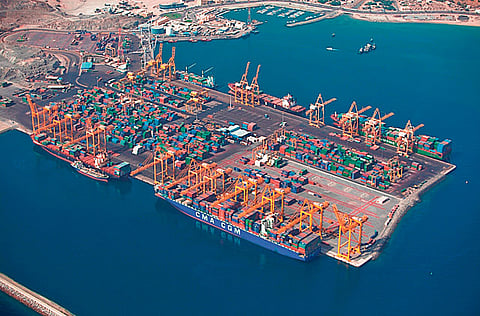Ports and logistics finally get a digital windfall
Blockchain and AI start to deliver on efficiency and cost gains

By Peter Richards, Special to Gulf News
A thriving e-commerce industry over the last two decades has given birth to a new kind of consumer – one who values time, efficiency and transparency above all. This industry is expected to reach $28.5 billion by 2022 in the Middle East and North Africa alone, with global annual growth expected at 23 per cent between 2018-22.
While the e-commerce boom is attributed to many factors, the logistics industry stands out as one of the largest contributors. As a result, the global logistics industry is on a tremendous growth trajectory estimated to reach $726 billion by 2020.
While maritime trade continues to stand the test of time by evolving and adapting to market requirements - and still responsible for 90 per cent of global trade - the shift in consumer trends justifiably calls for deeper technology integration and innovation in the industry, which has been typically traditional in its approach and operations up until recently.
More than random upgrades
Ports are competing to adopt efficiency-driven technologies from artificial intelligence to blockchain and IoT to digitise and automate processes in a bid to offer customers pricing benefits and faster services. While there are several ways in which digitisation in logistics is impacting trade, and in particular e-commerce, the strongest influencers, in our experience, are:
* Automation to enhance productivity
By seamlessly easing up the watch-keeping duties, inspections and upkeep, improving capacity management, security and safety and even automated mooring, automation is expected to bring in a 10-35 per cent more productivity coupled with 25-55 per cent reduction in ports’ operating expenses, a McKinsey study reveals.
Apart from significantly reducing the administrative burden of information exchange between customers, cargo and port facilities, AI and smart drone technology is creating impact through its ability to significantly effect productivity gains.
* Blockchain to improve connectivity and transparency Blockchain-enabled technology has the potential to provide a transparent, secure and accurate way of capturing and sharing data with key parties. Many organisations have already begun the march towards capitalising on blockchain in a bid to simplify the lengthy and time-consuming data management procedures.
Companies are investing in blockchain prototyping to significantly enhance the speed of operations and delivery time, while also increasing data security and transparency.
* End-to-end logistics
The prospect of end-to-end services has proved to be highly profitable in the industry. Whether this means faster customs clearance through on-site qualification and testing services, or access to warehousing or port-to-door logistics, the bottom-line for customers is ease, security and speed of delivery of goods to the end-user.
Cargo clearance services such as S.P.O.T, have been a huge value-add. By offering unparalleled nation-wide connectivity, faster transit times, enhanced online customs clearance, on-site cargo inspection, testing services and up to 80 per cent delivery cost savings, the service has already enabled customers to save both time and cost.
* Advanced terminal operating system for better service at lower costs As customer expectations increase, so does the need to meet these expectations satisfactorily and economically. While in most instances, the end-consumer remains “shipper agnostic”, which is where they don’t care who or how their goods are delivered, what they do care about is how quickly and cheaply these items get to them.
The implementation of an advanced terminal operating system, which seamlessly connects customers, cargo and port facilities, while reducing the cost implication of error and delays, can bring unparalleled efficiencies to the operations and meeting customer expectations.
* Green technology
While there is significant innovation under way, what holds immense promise is the ability to scale up operations sustainably. Automation in logistics can help reduce wastage and improve warehouse management systems.
From drones to green technology, the industry can collectively work to reduce the incidence of empty containers, wastage of resources and other such challenges wearing out the industry.



